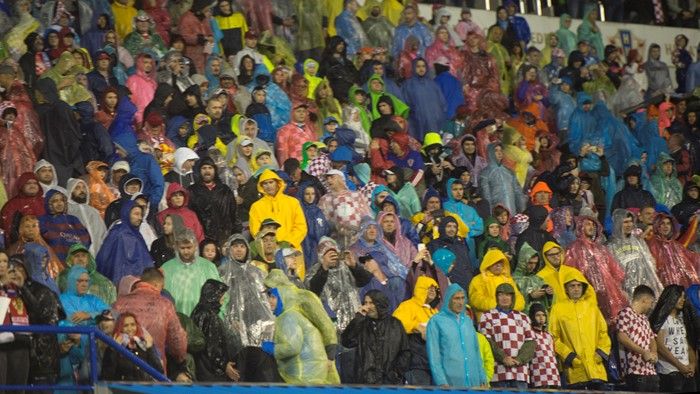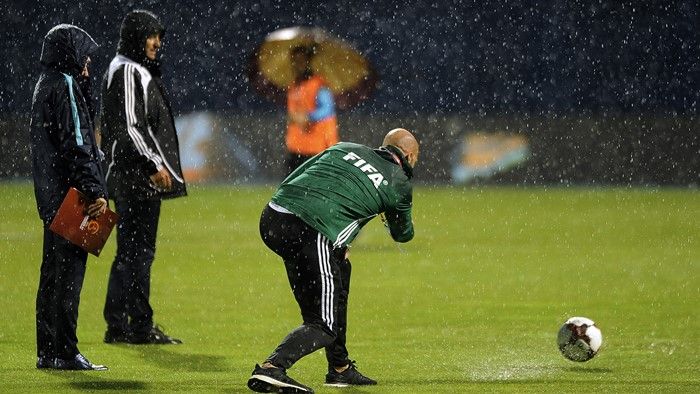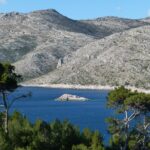I am sorry, Dinamo fans, but I think it’s time for a new Maksimir Stadium.
Unfortunately, I was one of those who experienced the absolute catastrophe, disaster, devastation, or whatever horror word suits you best to describe the total collapse at Maksimir Stadium over the weekend for Croatia and Kosovo’s World Cup qualifying match.
For one of the top ranked national teams in the world to play in such conditions, this was not only a total embarrassment for HNS on an international level, but we have once again shown that as a nation, we are unfit to accommodate our Croatian football superstars competing in the top leagues around Europe. At the very least, can’t we give them a proper place to play for their homecoming?
Karlo Ledinski of Vecernji List wrote on September 3, 2017:
“All 7,000 fans who were at Maksimir yesterday should get a diploma for their significant support of the national team, because coming to a match in this weather borders with sadomasochism. We have a team of players who play at Real, Barcelona, Fiorentina, Inter, but we have a state that is not capable of building a national stadium where they would be worthy of playing.”

HNS
Maksimir has shown time and time again that it is incapable of hosting a national team of such high caliber, and this is an argument I have found has no rebuttal.
Perhaps we can’t guarantee that the game would have been able to proceed had it been held at another stadium, but had the match taken place somewhere where there was at least up to date pitch drainage, the odds of playing would have been far greater.
Ledinski asks another question that falls in line with my thinking:
“Why does Macedonia, who’s placed 135th on the FIFA Ranking, have a new stadium in Skopje where the European Super Cup was recently held between Real Madrid and Manchester United? Why does Slovenia have a great stadium like Stožice? And Croatia has to play at ugly Maksimir, which was ‘made-up’ for last year’s Champions League and still appeared to be a third-rate European stadium.”
Funnily enough, Maksimir is not the be all, end all, of football stadiums in Croatia, and believe it or not, Croatia has quite a few other stadiums that could very well host national team matches. Take Rujevica or Poljud for example.
Novi List’s Edi Prodan makes a case for Rujevica on Sept 2, 2017.
“Rujevica is a high-quality stadium with all of the elements. If the teams were to play at Rujevica, the ball, in this rain, would skip without any problems, and the Croatian and Kosovar representatives would be able to demonstrate their art, and the result would be a reflection of the quality pitch. Rujevica has shown that it is capable many times. For example, during last year’s match between Rijeka and Hajduk which was followed by a real flood, it showed that it was capable even when it was the wettest.”
Drago Ćosić, Croatian TV journalist and sports commentator, best known for announcing football’s largest competitions such as the Champions League, European League, and World Cup, also believes that there are alternative, and overall better places such crucial representative matches can be played.
“Only Poljud is fit enough to meet the conditions for these qualifying matches,” Dalmatinski Portal reports the commentator saying on September 2, 2017.

HNS
According to Ledinski, the amount of money spent on “fixing up” Maksimir over the last 20 or so years could have easily been used towards building a new stadium. So what’s going on?
Unfortunately, none of this is surprising. While we support our Croatian national team to the grave, why are we nowhere to be found when they need something from us, something that is a basic requirement of the game?
The stadium’s failure to withstand rainfall hopefully sends yet another message to UEFA, and HNS that Maksimir is unfit to be a part of the organization’s approved facilities for representative matches.
Proden concludes it best:
“It is time for Maksimir to finally be given a red card for national team matches and for such matches to be played primarily in Rijeka and Split where the pitches and the public are the best. And, of course, we need someone serious in this country, if there is one, to finally approach HNS.”









